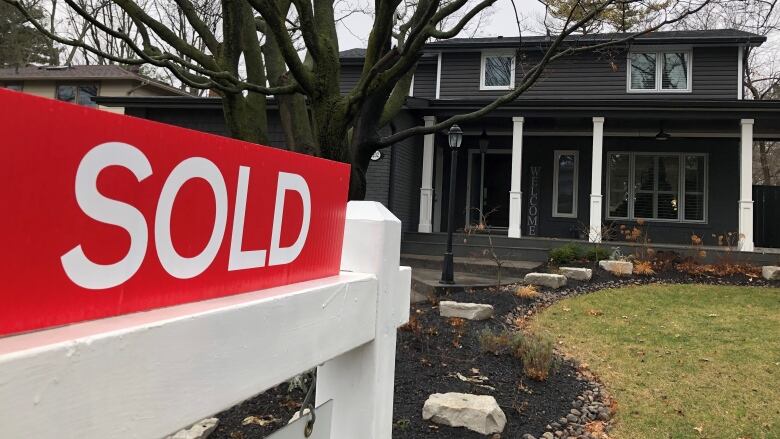Record home sales expected this year, CREA says amid February increase
The national average home price is forecast to rise by 16.5 per cent to just over $665,000 in 2021

The Canadian Real Estate Association said its outlook suggests home sales will remain strong this year, resulting in a record number of sales, but then start to cool in 2022.
The updated outlook came as CREA says home sales in February were up 6.6 per cent compared with January and up 39.2 per cent compared with a year ago.
The actual national average home price in February was a record $678,091, up 25 per cent from a year earlier.
The association said it expects nearly 702,000 properties to trade hands through Canadian MLS systems this year, compared with 551,262 in 2020. Home sales are forecast to be around 614,000 units in 2022.
Meanwhile, the national average home price is forecast to rise by 16.5 per cent on an annual basis to just over $665,000 in 2021 and $679,341 in 2022.
Pandemic hasn't scared off buyers
CREA's heated predictions show COVID-19 has not spooked buyers, who have waded into expensive markets even as layoffs are plentiful and unemployment high. Throughout the second half of 2020 and the start of 2021, realtors reported bidding wars and high numbers of offers for suburban homes or properties that need renovations.
The CREA doesn't believe those trends will dissipate soon.
"At this point everyone knows how far the current monthly sales numbers are from historical norms, and that they have been setting record after record for eight months now, so this should not be a surprise," CREA chair Costa Poulopoulos said in a statement.
February was a "super competitive" month, said Cody Skrzypkowski, a realtor with the Keller Williams Real Estate Associates North Group in Toronto.
It's now normal for him to see condos priced at under $800,000 receiving multiple offers and he's noticing the appreciation on many properties is rising by double digits within a month or two.
"I've never seen pricing like this in my career," said Skrzypkowski.
Price jumps outside major cities as well
Those price jumps aren't just reserved for traditionally hot real estate markets like Toronto or Vancouver, according to theCREA.
The largest year-over-year gains above 35 per cent that CREA reported came from the Lakelands region of Ontario cottage country, Tillsonburg District and Woodstock-Ingersoll.
Price hikes in Hamilton, Guelph, Cambridge, Brantford, Kitchener-Waterloo andPeterborough hovered between 25 and 30 per cent, but prices increased by 18.8 per cent in Montreal and by between 10 and 15 per cent on Vancouver Island, Winnipeg, the Greater Toronto Area and Quebec.
A spike between five and 10 per cent came in Greater Vancouver, Victoria, Regina and Saskatoon, and prices shot up by 3.5 per cent in Calgary and Edmonton.
Costa and CREA senior economist Shaun Cathcart blamed COVID-19 and supply for the conditions.
"We are right at the start of the first undisturbed [by policy or lockdown]spring housing market in years and we also have the most extreme demand-supply imbalance ever by a large margin," said Cathcart in a release.
He believes demand is building because of regulatory changes in the years leading up to COVID-19 and because people now see the need to have a home to ride out the pandemic. Many also want to make a purchase before prices climb any higher and while mortgage rates remain at record lows, he said.
Both CREA and Skrzypkowski believe supply will slowly return to the market, but it will take some time to cool conditions.
Skrzypkowski said, "If you're a seller, congrats. If you're a buyer, buckle up because it may not be the most easy process for you."
Housing starts slowed last month
Earlier, the Canada Mortgage and Housing Corp. said the annual pace of housing starts in February slowed compared with January.
The housing agency said the seasonally adjusted annual rate of housing starts for February fell to 245,922 units compared with 284,372 in January.
The drop came as the annual pace of urban starts fell 14 per cent in February to 231,042 units, as the pace of starts of apartments, condos and other types of multiple-unit housing projects fell 15.8 per cent to 163,757.
The annual pace of urban starts of single-detached homes fell 9.3 per cent to 67,285.
CMHC estimates the annual pace of rural starts at 14,880 units.
The six-month moving average of the monthly seasonally adjusted annual rates of housing starts was 242,777 in February, down from 244,963 in January.













_(720p).jpg)


 OFFICIAL HD MUSIC VIDEO.jpg)
.jpg)



























































































